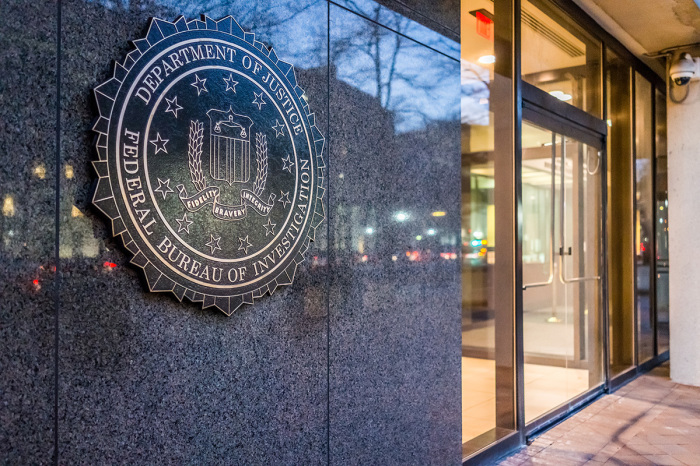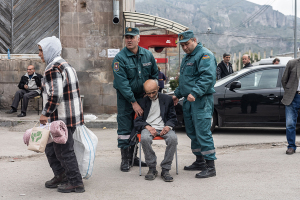DOJ clears FBI of targeting 'radical-traditionalist Catholics' in controversial memo

The U.S. Department of Justice's Inspector General Michael Horowitz maintains that the FBI did not commit any wrongdoing or demonstrate hostility toward religion by circulating an internal document warning about connections between "racially or ethnically motivated violent extremists" and "radical-traditionalist Catholic ideology."
Horowitz submitted a report to several committees of U.S. Congress Thursday. The document looks into the "actions and events, including any underlying policy direction" that served as the basis for the FBI Richmond Field Office circulating a memo in January 2023 addressing a purported link between "Racially or Ethnically Motivated Violent Extremists (RMVEs) and 'Radical Traditionalist Catholic (RTC)' ideology."
The report follows outrage from lawmakers over the report declaring that "the increasingly observed interest of racially or ethnically motivated violent extremists (RMVEs) in radical-traditionalist Catholic ideology almost certainly presents opportunities for threat mitigation through the exploration of new avenues for tripwire and source development."
When listing examples of radical-traditionalist Catholic groups, the FBI document cited the far-left activist group Southern Poverty Law Center, which has developed a reputation for labeling organizations with traditional beliefs about marriage, sexuality and abortion as "hate groups."
Groups listed include Catholic Apologetics International in Greenville, Pennsylvania; Catholic Family News/Catholic Family Ministries, Inc. in Niagara Falls, New York; Christ or Chaos in Corsicana, Texas, and Culture Wars/Fidelity Press in South Bend, Indiana.
The FBI initially apologized after the memo was leaked by a former FBI special agent, insisting that it did not meet the "exacting standards of the FBI." Congress authorized a review of "any orders or direction regarding the [domain product] from any official in any field office concerning purported proximate links between any religion, any political affiliation, or the intent of this report" as part of the Intelligence Authorization Act for Fiscal Year 2024.
The inspector general's report detailed how the domain product circulated in the FBI Richmond Field Office early last year was predicated on an investigation into an unnamed defendant who made "online statements advocating civil war and the murder of politicians" that began in 2019. The man was arrested in 2020 "after he vandalized and slashed the tires of a parked car."
While he was released from jail a year later, the FBI kept an eye on him and discovered a social media page affiliated with the defendant containing "Nazi symbols and rhetoric, as well as posts advocating killing police officers, 'ganging up on and beating' racial and religious minorities, conducting a mass shooting at a school for special needs children, taking up armed resistance against the government, learning how to manufacture pipe bombs, and using untraceable means to purchase supplies to manufacture 3D-printed weapons."
"In early 2022, Defendant A began to attend a church (Church 1) associated with an international religious society that advocates traditional Catholic theology and liturgy but is not considered by the Vatican to be in full communion with the Catholic Church (Organization 1)," the report stated.
In one social media post made by the defendant, he lamented that he "had to deal with the priest and some (thankfully not all) the parishioners talking about how 'Hitler bad' though thankfully they do actually acknowledge that the allies were evil."
"The FBI task force investigation found that Defendant A 'became more and more overt' in discussing plans to carry out attacks, including making comments to others at Church 1 about his intent to commit violence," the report states.
"Defendant A's advocacy of violence included communications with two individuals who attended Church 1 in which he made antisemitic comments, discussed the purchase of a pressure cooker, and used terminology consistent with building a pressure cooker bomb."
After the defendant was arrested again in November 2022 following the discovery of "ammunition, a firearms build kit, a 3D printer, multiple Molotov cocktail-type improvised incendiary devices, and lockpicking devices" at his residence, the FBI interviewed several people at the church he attended.
Those who spoke with the law enforcement agency noted the defendant's "'unusual' and 'concerning' behavior and openly racist views."
While FBI intelligence analysts considered creating a domain product based on what they described as the "increasing intersection of rad-trad (radical-traditional) Catholics and [Domestic Violent Extremists]," one of the analysts told investigators that "he found it "completely incongruous" that an RMVE was attempting "to find common ground or find a community with this particular faith community.'"
Although he conceded that "there was no evidence that Defendant A was being radicalized at Church 1, because he had been on the FBI's radar 'as an unstable, dangerous individual' before 'any association with any Catholic related entity whatsoever,'" the analyst expressed concern that "Defendant A was attending Church 1 and 'interacting with a group of people who … may not understand, or know what to do with someone of his caliber or … his mindset,' and that other RMVEs similarly might be attracted to other parishes."
"Analyst 1 stated that the intended focus of the proposed DP was on Defendant A and other similar RMVEs, not on a particular church or religion," the report noted. "Both Analysts 1 and 2 denied targeting any individual for holding or practicing a specific religious faith. Analyst 1 acknowledged that all religious beliefs are protected by the First Amendment and called any suggestion that he was motivated by anti-Catholic bias 'patently false.'"
When asked to explain why they chose to use the phrase "radical-traditionalist Catholic" in the domain product, the analysts cited the defendant's description of himself as a "rad-trad Catholic clerical fascist" as the reason for embracing such terminology.
Regarding "references in the DP to outside organizations [such as SPLC] and sources that use the term 'RTC' to describe certain religious entities and ideologies that these organizations and sources have designated as hate groups," the analysts acknowledged that "there were concerns about perceived bias on the part of those organizations and sources." However, they stressed that "the evidence supporting the DP was not based on any information from these outside organizations."
The report concluded by maintaining that the FBI's creation of the domain product did not amount to unfairly targeting a religion.
"Our review did not find evidence that anyone ordered or directed Analyst 1 or 2 to find a link between RMVEs and any specific religion or political affiliation, including Church 1, or that there was any underlying policy direction concerning such a link," it asserted.
"Additionally, our review of emails, instant messages, and text messages for Analysts 1 and 2 during the relevant time period did not identify any evidence of discriminatory or inappropriate comments by them about Church 1, or individuals who practiced a particular religious faith or held specific political beliefs," the report continued.
"Our review of evidence concerning the development and finalization of the DP did not find evidence that FBI Richmond took investigative steps involving Church 1 or any other church beyond those authorized in the investigation of Defendant A — namely, using a CHS to monitor Defendant A's interactions with others at Church 1 to determine whether he was planning or inciting violence, and interviewing church personnel about Defendant A after his arrest."
The report praised the FBI's corrective actions implemented amid the backlash to the memo, including "expanding training on analytical tradecraft standards and domestic terrorism terminology, enhancing review and approval requirements for intelligence products involving a sensitive investigative matter, and formally admonishing the employees involved."
Ryan Foley is a reporter for The Christian Post. He can be reached at: ryan.foley@christianpost.com




























